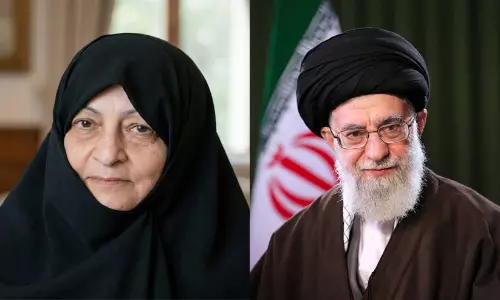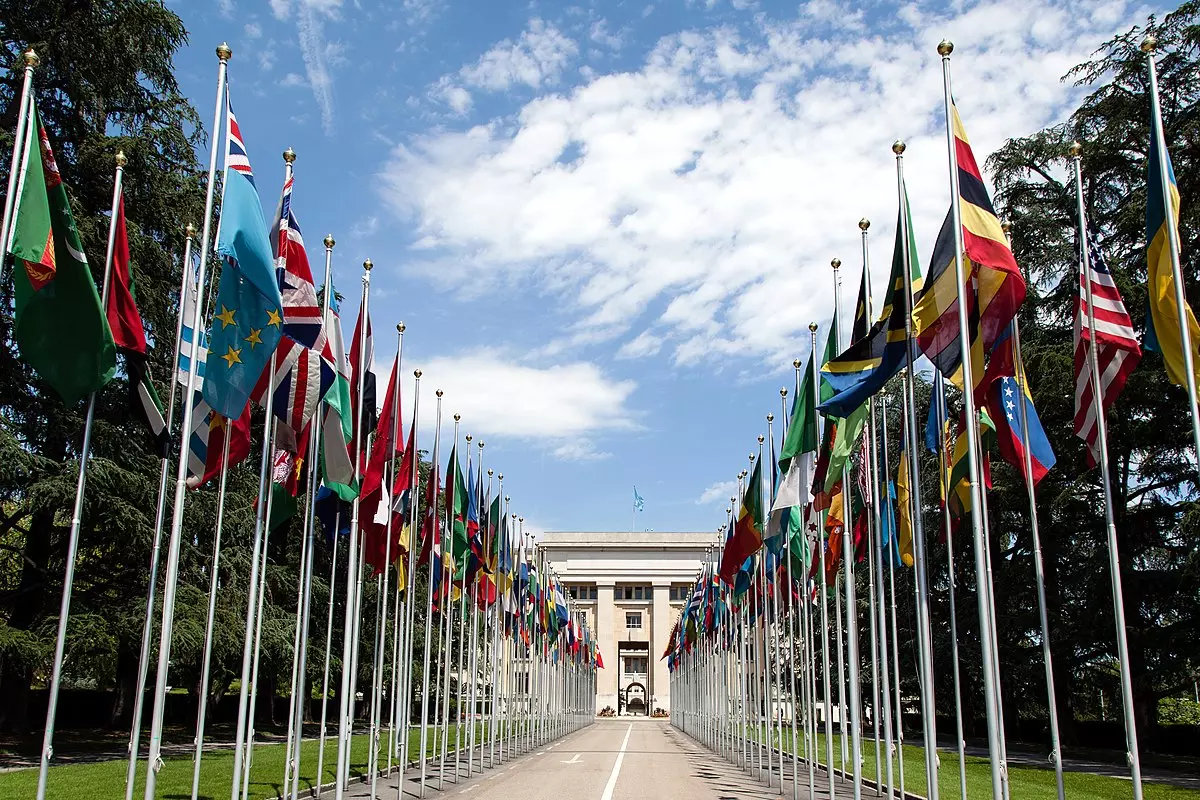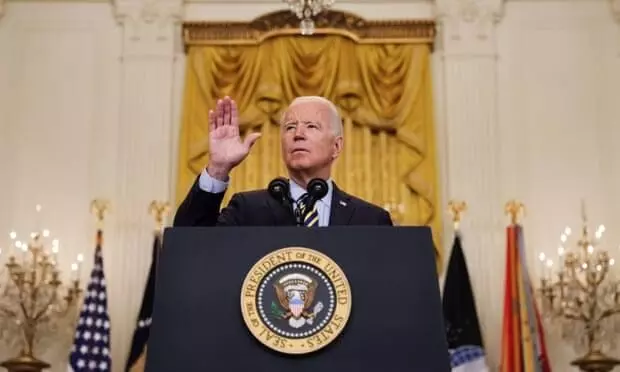
The end of Western dominance
text_fields"We are coming to the end of Western political and economic dominance. The world is going to be at least bi-polar and possibly multipolar," Tony Blair, former British Prime Minister (1997-2007) predicted in his annual lecture at the Ditchley Foundation on Saturday 16th July 2022, Russia Today (RT) Chanel reported. He continued that China which is "already the world's second superpower", will compete with the West "not just for power but against our system, our way of governing and living," the Labour politician warned. Beijing "will not be alone. It will have allies. Russia now for sure. Possibly Iran."
It is for the first time in modern history that the East is competing on equal terms with the West and the global dominance of the US and its allies. Due to the tragic effects of the Covid-19 pandemic and the conflict in Ukraine, the living standards of a large part of the Western population are stagnating. The economic damage from the Ukrainian conflict has contributed to a significant slowdown in global growth in 2022 and added to inflation. Fuel and food prices have increased rapidly, hitting vulnerable populations in low-income countries hardest. Global growth is projected to decline from an estimated 6.1 percent in 2021 to 3.6 percent in 2022 and 2023. This is 0.8 and 0.2 percentage points lower for 2022 and 2023 than projected earlier.
China's significant rise over the past two decades has remade the landscape of global politics. Beginning with its entry into the World Trade Organization in December 2001, China rapidly transformed its economy from a low-cost "factory to the world" to a global leader in advanced technologies. Along the way, it has not only transformed global supply chains, but also international diplomacy, leveraging its success to become the primary trading and development partner for emerging economies across Asia, Africa and Latin America. Multilateral efforts are needed to respond to the consequent humanitarian crisis, prevent further economic fragmentation and maintain global liquidity.
The World Economic Foum's Chief Economists said it expected lower economic activity, higher inflation, lower real wages and greater food insecurity globally in 2022, pointing to the devastating human consequences of the fragmentation of the global economy.
Low-income countries are struggling to manage debt distress, tackle climate change, and end the pandemic diseases and risks. It was then that Russia decided to stop all gas supplies to Germany through the Nord Stream 1 pipeline for ten days under the title of an annual maintenance procedure. This 1,200 km long pipeline under the Baltic Sea transports about 55 billion cubic meters of gas annually to northern Germany and from there to many European countries, which is more than 40 percent of the needs of the European continent, which will make it shiver with cold before the harsh winter arrives.
The question that is reluctantly repeated in the circles of Europe, both old and new, is whether President Putin will reopen the pipeline, or will the closure be permanent? Nobody in Europe has an instant answer. The state of anxiety and terror is strongly prevalent in most capitals due to the increasing possibilities of the continent plunging into a severe gas crisis during the coming winter, especially due to the failure of tireless attempts to find alternatives to Russian gas, whether from the Gulf region (Qatar) or North Africa (Algeria).
The prevailing impression in Europe at present is that Russia, after its forces invaded southeastern Ukraine, has separated the Donbass region by force. It is now beginning to move to the second stage of the war. After the first six months of its outbreak Russia has begun to use the gas and oil as weapons.The main purpose of US President Joe Biden's visit to Saudi Arabia was to resolve the oil crisis. He wanted also to expand the US influence in the region and enhance his influence in the domestic political sphere. Now, the relevant question is whether Biden could achieve any of these goals.
First, a security treaty, or what was called an "Arab NATO" was not established at the summit, which is what has been talked about a lot in the American media recently. Even the Iranian threat factor, the importance of the confrontation on which the US president relied on implementing this project did not work.
Second, he failed to expand the Arab-Israeli normalization at the expense of Saudi Arabia.
Thirdly, Arab leaders, moreover, vigorously reminded Biden of the need to resolve the Palestinian issue, for which the Democratic Party administration does nothing, just like the previous Republican administration.
An article in the American website nationalinterest.org warned the United States that if it wanted to remain at the head of the existing international order, it must confront the serious efforts underway by China and Russia to undermine its global financial hegemony. The author of the article, Axel de Ferno, said that one of the facts that has persisted throughout history is the link between the financial and geopolitical forces, adding that while the US dollar is still the world's dominant currency, recent statements by US officials have made it clear that the United States no longer enjoys geopolitical superiority, as it did during the post-WWII years. He stressed that the global economy is still dependent on financial institutions managed by the United States, and there is no indication that this will change any time soon.
The situation warrants concern for Americans. Yet, in the aftermath of Russia's war on Ukraine, de Verno says, the tide appears to be turning, perhaps not permanently, but in a way that should alarm US policymakers; the Sino-Russian alliance is trying to drag other countries into an attractive alternative to achieve an end goal, which is to build a financial system completely independent of Washington's control.
The writer notes that China and Russia have already discussed merging their financial systems, as Moscow assured Beijing that it is ready to use the yuan in its foreign reserves to speed up the process, saying that in conjunction with the complex Russian conversion plan for oil and gas payments, it will continue to operate as long as European countries cannot reduce their dependence. Without suffering unacceptable financial setbacks, it is clear that Beijing and Moscow aim to undermine the global hegemony of the US dollar.
Rising fuel prices were compelling him to find alternatives to manage the European energy market. Ben Cahill, an energy security expert at the Center for Strategic and International Studies (CSIS) said, "I think there is a sense in the White House that they need to be able to pick up the phone and have a constructive dialogue with lots of parties in the oil world that starts with Saudi Arabia."
The US appealed to the Saudis to pump more oil to help bring down energy prices. Even though Riyadh initially rebuffed those requests, just days before the president's trip was announced, Opec Plus, the oil producers 'group of which Saudi Arabia is the de facto leader, approved a modest increase in production. But, it was only nominal according to the Western observers.
Alex Lawson, Energy correspondent of The Guardian newspaper reported on Mon 18 Jul 2022 that the price of oil rose after the US president, Joe Biden, came away from talks in the Middle East without an agreement on raising supply. It stated that Brent crude rose 2.6% to $103.88 (£86.91) after Saudi Arabia's foreign minister, Prince Faisal bin Farhan Al Saud, quelled speculation over an output increase. Alex Lawson said that officials at a US-Arab summit on 16th July, Saturday did not discuss oil and that the Opec oil cartel nations would continue to assess market conditions.
According to Naeem Aslam, the chief market analyst at Avatrade, "The message is that it is Opec that makes the oil supply decision, and the cartel isn't remotely interested in what Biden is trying to achieve."
Frankly speaking, the Saudi government has proven its mettle before Biden. Biden's speech at Ben Gurion Airport was a declaration of his Zionist affiliation as he stood on the same land that was usurped by the advocates of the racist, terrorist ideology that underpins the occupation state of Israel: Zionism.
At the end of his visit to occupied Palestine, and before his arrival in Saudi Arabia, he announced in a joint statement - "The Jerusalem Declaration" - with Israeli Prime Minister Yair Lapid, a pledge to prevent Iran from acquiring a nuclear weapon and promised to support Israel's military superiority in the region.
This includes defence project cooperation, including anti-aircraft and missile systems.
Biden said that Washington will work with its partners to confront Iran's aggression and that it will support Tel Aviv's role in "building a robust regional architecture "; his visit to Saudi Arabia was intended to achieve this goal. Alliance or no alliance, the US wanted to remain the guarantor of Israel's interests in any regional developments, and the integration of the occupation state into any Arab military grouping.
Anyway this project has simply been postponed, not cancelled. America's goal to integrate Israel into the Arab region did not take off. Normalisation is the magic word used by the US for such a disgraceful alliance. It was significant that the Palestinian issue was met with a unified position from the Arab countries, which demanded a just solution to it, before talking about the issue of normalization with Israel.
The convening of the Jeddah summit, it could be said, was in itself an important success .It was a new chapter in Saudi-American relations and Gulf-American relations. Riyadh made it clear that the relationship must necessarily be based on equality, and that respecting the parties' values is a basis for partnership, and any decision must be based on the approval of all parties involved. The resolute foreign policy led by Crown Prince Mohammed bin Salman, as the leader of the region, has shown its success.
In short, the message given to Joe Biden and his team was, "No dictates. Our interests and values come first." The Secretary-General of the Muslim World League and Chairman of the Association of Muslim Scholars, Dr. Muhammad Al-Issa, praised the outcomes of the "Jeddah Summit for Security and Development" hosted by Saudi Arabia, with the participation of the Gulf Cooperation Council countries, Jordan, Egypt, Iraq and the United States, stressing that achieving peace and harmony in the region is an essential pillar.
At Jerusalem and Jeddah, Biden urged Israel and Arab countries to push back on Russian, Chinese and Iranian influence that has expanded with the perception of America's retreat from the region. The Iranian project has transformed over time, threatening not only America's allies, but America's interests itself with the expansion of Russian influence in Iran, especially with regard to the nuclear program, which Russia completely supports, as well as ballistic and other armament programs. China is also playing an important role in its economic areas. This is what prompted US President Joe Biden to declare that America will not allow China and Russia to fill the void it left, after the Americans sensed the closeness of Russia and China's relations with the countries in the region.
Immediately after the summit in Jeddah, Russian President Vladimir Putin held meetings in Tehran, seeking to deepen ties with regional heavyweights as a challenge by Moscow against the United States and Europe. The trip to Tehran has symbolic significance for Putin's domestic audience as well, showing off Russia's international clout even as it grows increasingly isolated due to the Ukrainian conflict.
In a sign of increasingly close military cooperation, Russian officials had in recent weeks visited an airfield in central Iran at least twice to review Tehran's weapons-capable drones - for possible use in Ukraine, the White House alleged. Putin hailed the importance of close ties between Moscow and Tehran at his meetings with the Iranian leaders. In a closing statement, he offered strong support to Tehran over the deadlocked nuclear deal, calling for its full revival and a complete lifting of sanctions against Iran to allow a "free development of cooperation in any areas without any discrimination."
Iran's Supreme leader Khamenei said that if Russia hadn't sent troops into Ukraine, it would have faced an attack from NATO later, a statement that echoed Putin's own rhetoric and reflected increasingly close ties between Moscow and Tehran as they both face crippling Western sanctions. NATO allies have bolstered their military presence in Eastern Europe and provided Ukraine with weapons to help counter the Russian attack.
Yet, the military supremacy of Russia is winning the battle day by day. And hence the admission by Tony Blair, the former British Prime Minister (1997-2007) that the Ukraine war showed that the hegemony of the West is witnessing its end and China has become a great power in partnership with Russia.
























